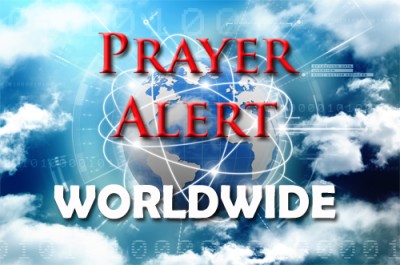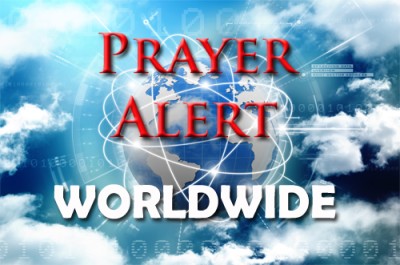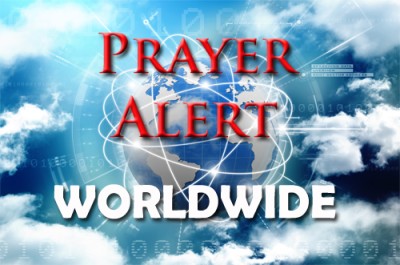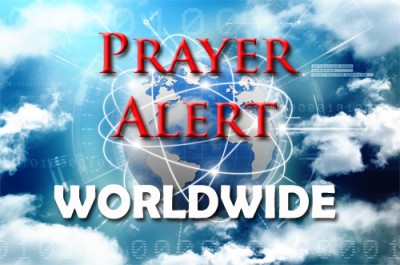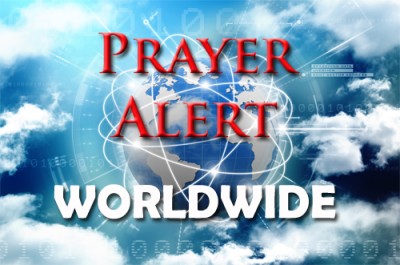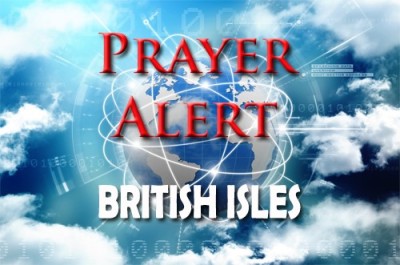Afghanistan: persecuted and hungry
21 Apr 2023Sixty days in a cage, no light, and tortured, is one of the extreme cruelties which Christians in Afghanistan experience. They are under a death sentence, yet there are over 10,000, almost all converts from Islam. They have a long, dangerous, and deadly road ahead of them. Please pray for the underground church facing the ultimate threat: turn back to Islam or die. Pray also for the safety of the known Christians who have been open about their faith. May God give them wisdom in all they say and do. Also a humanitarian crisis of incredible proportions has grown more complex and severe since the Taliban took control. Job losses, lack of cash, and soaring food prices have resulted in nearly 20 million not having enough to eat. Afghanistan is on the brink of economic collapse. The currency is at an all-time low. See
Sudan: battle for control
21 Apr 2023Plumes of smoke fill Khartoum’s sky as Sudan’s military and paramilitary battle to control Sudan. Fighting that erupted on 15 April has killed hundreds, wounded many more, and damaged homes, hospitals, airport and residential water supplies. The power struggle is between General Burhan, commander of the armed forces, and General Dagalo, head of Rapid Support Forces. They were allies and orchestrated the 2021 military coup that derailed Sudan’s transition to democracy. Now they are killing each other in the streets, and the conflict could lead to Sudan’s collapse. Pray that this will not happen and for a return to dialogue. The region is already grappling with ongoing conflicts in Libya, CAR, South Sudan, Ethiopia, and Chad. All of them are theatres of ongoing armed conflict and all share borders with Sudan. Their conflicts have killed tens of thousands and displaced millions more. If the situation in Sudan worsens, all the Horn of Africa will suffer. See also
Yemen: peace talks
21 Apr 2023An agreement to restore relations between Saudi Arabia and Iran has opened the possibility of peace talks between Riyadh, which backs Yemen’s official rulers, and the Iran-aligned Houthi rebels. Saudi and Houthi representatives met with Omani mediators in Yemen last week to negotiate a permanent ceasefire. Pray for further progress. The UN estimates that 4.5 million Yemenis are displaced and two-thirds of the population are in dire need of humanitarian aid. In eight years Yemen has endured terrible suffering from bombs and mines causing needless deaths. The war is fuelled by Saudi Arabia, Britain, America and the United Arab Emirates - and also Iran, which has supplied funds and weapons to Houthi rebels. There are miles of negotiations and diplomatic manoeuvrings to go, but to reach this point is a tremendous tonic for Yemenis who have seen war plunge their beautiful and naturally resource-rich country into one of the world’s worst humanitarian crises.
Asia: severe heatwave
21 Apr 2023The worst April heatwave in Asian history is causing deaths and forcing schools to close. Temperatures of over 40C in Bangladesh have caused road surfaces to melt, and if the heat does not abate the ministry of environment will declare a temperature emergency. Six cities in India recorded temperatures above 44C. India has become particularly vulnerable to extreme heat recently; experts fear 2023 could be even worse. As temperatures and humidity soar, causing an orange severe heatwave warning, rural workers and labourers are forced to work outside. Weekend thunderstorms could abate conditions, but extreme heat is projected to continue into next week. Thailand has issued heatstroke health warnings and the high temperatures could continue beyond the usual summer months, causing drought and crop failure. China reported record-breaking temperatures for April in many locations, and over a dozen countries are experiencing similar problems. The death toll is expected to rise. Pray for the frail and elderly to drink enough fluids, including in the UK as meteorologists forecast an even hotter summer for us than in 2022.
Settlement expansion is not the only reason why a dialogue between Palestinians and Israelis is almost impossible. The USA, which sponsored talks in the past, has other preoccupations. It is much more concerned with its rivalry with China and the war in Ukraine. The Palestinian political leadership is deeply divided between Hamas in Gaza and the Palestinian Authority on the West Bank. They are not capable, as things stand, of making or delivering any sort of deal. The Palestinian Authority is barely capable of exercising its own limited powers. Israel is deep in its own internal political crisis about the nature of its own democracy. Peace between Palestinians and Israelis is as far away as ever. Neither side trusts the other. This year a serious upsurge in violence and death is a serious warning of even worse trouble ahead. Everyone here knows the risks they are running, but there is no realistic plan to head off the deadly trouble that lies ahead.
Israel: terrorists captured
13 Apr 2023The Israel Defense Forces (IDF) have arrested a terrorist cell in Jenin that intended to carry out an attack ‘in an immediate time frame’. Five terrorists were detained during the raid carried out by the IDF’s undercover counterterror unit, a paratrooper patrol, and a Shin Bet-directed military unit which seized ammunition and military equipment. Two other wanted suspects were arrested overnight in counterterrorism operations elsewhere. In a village near Ramallah, Israeli forces arrested a wanted man. During the raid, rioters burned tires and threw stones at the soldiers, who responded with crowd disbursement measures. Another suspect was arrested in the village of Abu Najim, where Molotov cocktails and stones were thrown at soldiers, who employed crowd disbursement methods. The wanted men were transferred for questioning. These arrests follow a week of terrorist activity, killing Israelis and tourists. See also this week’s world article, ‘Israel: terrorist tensions’.
Iran: a different path
13 Apr 2023Before the 1979 Islamic Revolution, Iranian women could vote and wear Western clothing. Religious minorities, like Christians, were protected by law. Since 1979, leaders have been doing everything according to Islamic principles, which is driving people to look for something else. Jesus is ‘something else,’ something separate from Islam, and many Iranians are finding him. Many Iranian believers also have Muslim friends and family members who are sick of Islam, are sick of what is happening in their country, and want something else. To help Iranian believers reach loved ones and neighbours for Christ, Voice of the Martyrs USA is sending 300,000 Bibles into Iran this month. When equipped with Scripture, Iranian believers can hand those (frustrated) people a Bible and say, ‘Why don’t you read this? This is a different path.’
Archbishop of Canterbury’s mental health
13 Apr 2023Justin Welby has spoken candidly about taking antidepressants instead of ‘something much worse.’ In a Holy Week lecture series at Canterbury Cathedral, he spoke of having professional help with his mental health, saying, ‘As the psychiatrist I see tells me, the aim is not to make me so laid back that I'm horizontal, but just to settle things enough that I react like an average sort of human being. I'm sad when things are sad, and happy when they're happy, and so on and so forth.’ He likened human emotions to Winnie the Pooh characters, comparing himself to Eeyore, the often melancholy donkey, as opposed to a ‘bouncy’ Tigger. Some of us are Tiggers, some are Eeyores. Probably, some are other characters in Winnie the Pooh.’ The lecture was based on the emotional rollercoaster within the Easter story, from Jesus' persecution and death to resurrection joy.
